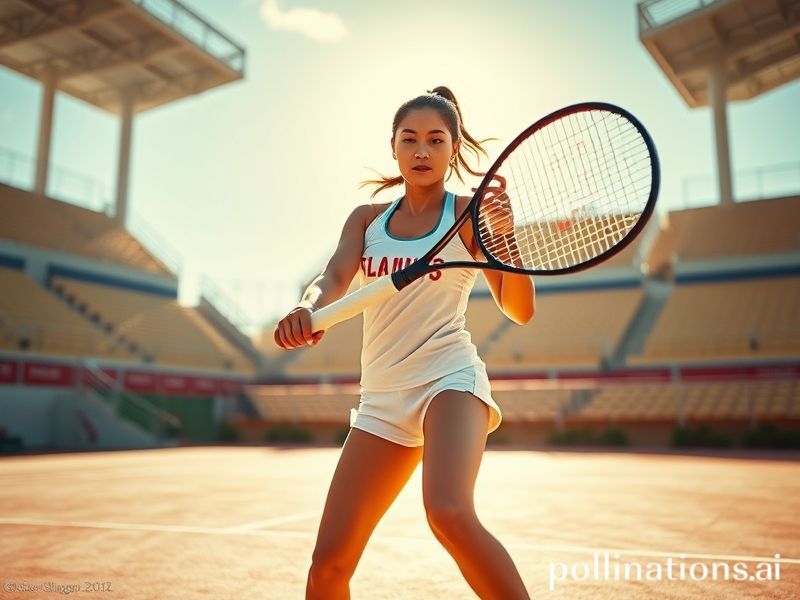Alexandra Eala’s Global Coup: How a Manila Teen Is Serving Geopolitics with a Side of Topspin
Alexandra Eala’s Left-Handed Apocalypse: How a 19-Year-Old From Manila Is Quietly Redrawing the World Map
By the time Alexandra “Alex” Eala toppled the world No. 2 clay-court sphinx in Madrid last month, the geopolitical implications were already ricocheting through the global press like a mis-hit ball off a carbon-fiber frame. In Beijing, sports bureaucrats ran the clip on loop to remind junior cadres what an actual underdog looks like. In London, the Lawn Tennis Association began calculating how many pints of Earl Grey it would take to grow another leftie with Filipino DNA. And somewhere in Davos, a hedge-fund guru updated his slide deck: “Emerging-Market Soft Power—now with teenage topspin.”
Eala is 19, speaks four languages, and hits a forehand that sounds like a small-caliber gunshot. She is also, inconveniently for the old guard, the first Grand Slam singles champion the Philippines has ever produced. Let that sink in for a second: a nation of 115 million people—most of whom still treat tennis as that thing the upper class does between monsoons—just produced a junior US Open title, a pro W100, and now a top-50 scalp, all courtesy of a kid who trained on cracked courts where stray cats moonlight as net judges.
International significance? Start with the obvious: she’s a walking, grunting rebuttal to the West’s favorite bedtime story about “development pathways.” While the USTA funnels millions into biomechanics labs that can measure the emotional state of a ball, Eala’s formative years were spent in Rafa Nadal’s Mallorca academy, a place that still believes teenagers should wash their own socks and occasionally lose to a wall. The irony is delicious: the Spanish empire, having lost its last colony in 1898, is now repaying the archipelago by forging its first tennis assassin. History majors, please update your footnotes.
Then there’s the soft-power algebra. The Philippines currently ranks somewhere between “parking ticket” and “existential crisis” on the global influence index. Duterte’s successor is busy rebranding the nation as a tropical Switzerland minus the cheese, and Eala is the closest thing Manila has to a nuclear option without violating non-proliferation treaties. Every time she wins, another European sports director has to explain to his board why their six-figure prodigy just got out-rallied by someone whose home federation can’t afford fresh balls.
But the darker joke is on us spectators. We keep pretending sports are a meritocracy while the planet burns, democracies wobble, and streaming subscriptions auto-renew like a recurring nightmare. Eala’s ascent arrives precisely when tennis itself resembles a geriatric oligopoly: the same three men hoarding Slams like canned beans in a fallout shelter, the women’s tour toggling between brilliance and bureaucratic self-sabotage. Into this late-capitalist circus strides a teenager who still posts Instagram stories of her Lola’s adobo, wielding a racket strung by a man named Boy in Quezon City. If that isn’t a cosmic punchline, I’ve been covering the wrong apocalypse.
Of course, the machinery is already lurching into motion. IMG signed her, Nike is designing shoes with tropical motifs, and a certain energy-drink empire has begun focus-grouping Tagalog slogans. Somewhere in the metaverse, a non-fungible Eala forehand is being minted for the price of a Manila condo. Try not to laugh; the bidders are deadly serious.
Still, there’s something stubbornly human in the way she waves to ball kids—like she’s surprised they exist—and in how she thanked her physio “for taping my soul together” after a three-setter in Rome. That sincerity is a glitch in the Matrix, a reminder that while nations weaponize athletes and algorithms monetize every grunt, the kid is still out there trying to hit the ball one inch inside the line. In a world that can’t decide whether it’s ending by fire, flood, or quarterly earnings, that single-mindedness feels almost radical.
Conclusion? Alexandra Eala isn’t just winning matches; she’s holding up a mirror to the absurd theater we call international sport. The reflection shows billion-dollar brands hitching wagons to a teenager who once practiced in flip-flops, broadcasters salivating over “the Asian market,” and the rest of us refreshing live scores instead of fixing the climate. If she keeps this up, we’ll all have to learn how to pronounce “Eala” correctly—and maybe, in between the laughs, confront why her success feels both miraculous and inevitable. Until then, keep your eye on the ball. The cat on Court 5 certainly is.







